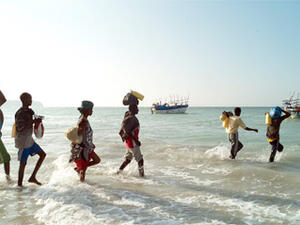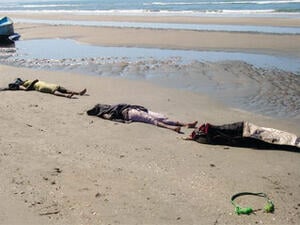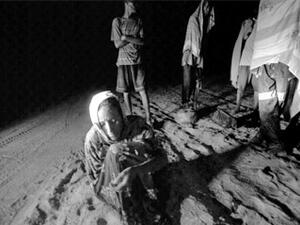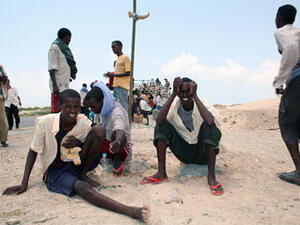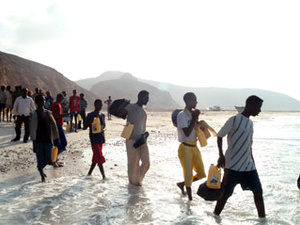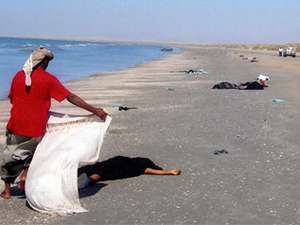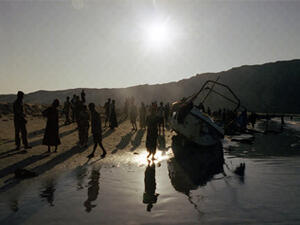More than 50 people die since resumption of Gulf of Aden crossings
More than 50 people die since resumption of Gulf of Aden crossings
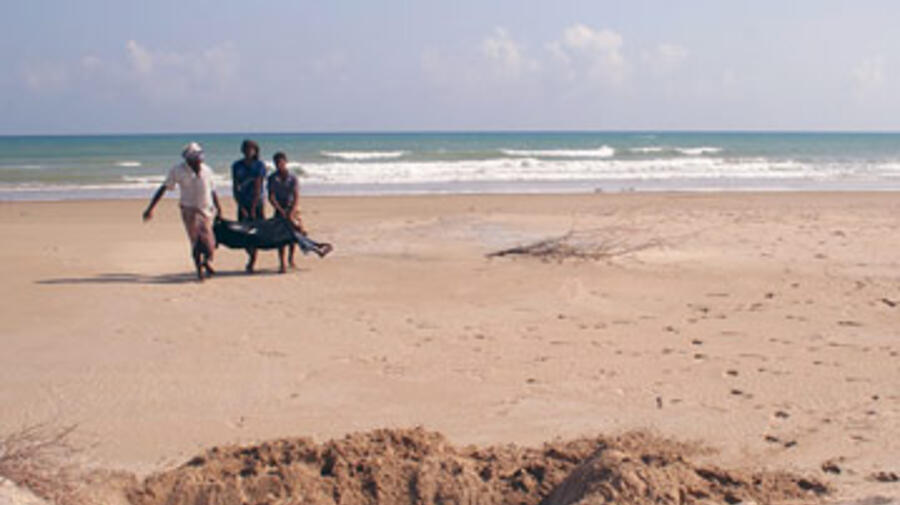
Yemeni fishermen prepare to bury the bodies of people who drowned during the boat crossing of the Gulf of Aden from Somalia. More than 50 people have died during the current sailing season.
SANA'A, Yemen, September 14 (UNHCR) - At least 56 people have lost their lives trying to make the perilous Gulf of Aden crossing from Somalia to Yemen since the full resumption of the current sailing season in early September, according to figures compiled by the UN refugee agency.
Since September 3, UNHCR Yemen has recorded the arrival of 12 boats carrying 925 Somalis, Ethiopians and others. Two or three other boats were reported to have crossed the Gulf of Aden from mid- to late August, but annual bad weather between June and the end of last month kept most smugglers off the high seas.
Another smuggler's boat making the crossing this month apparently failed to reach Yemen after encountering problems about 100 kilometres west of Bossaso in northern Somalia's Puntland region.
UNHCR received reports on Thursday that at least 100 Somalis aboard this vessel made it back to shore in Somalia after being adrift for six days. Many of them had been beaten, and some were reportedly doused with acid by the smugglers. The bodies of those who did not survive the six-day ordeal were reportedly thrown overboard, but figures were not available.
People on the last of the 12 boats to reach Yemen since September 3 told UNHCR staff earlier this week that they were beaten by smugglers during the trip and that 24 people had died - three as a result of beatings; 11 after being crammed into the hold of the boat; and 10 from drowning in waters offshore.
UNHCR questioning of earlier arrivals determined that at least another 32 people on three of the boats had lost their lives during crossings this month.
The survivors of the last boat also claimed that once they reached shore, they came under fire from military forces based in Yemen's Jalbad region. One Ethiopian was wounded and transferred for medical assistance by UNHCR.
The passengers - most of them from volatile areas in Somalia and the increasingly unstable Ogaden region in Ethiopia - said they paid between US$70 and US$150 to make the crossing. There were also two Sudanese among the group, and they expressed a desire to seek asylum in Yemen.
The deaths in the Gulf of Aden are a reminder of the risks taken every year by thousands of people resorting to smugglers in the Gulf of Aden, the Mediterranean and other waters. In recent months, international agencies working in Somalia have joined forces and set up a task force to better address the problem.
UNHCR has scaled up its presence to some 25 staff in Somalia's Puntland and is preparing as a first step - with partners like the UN Office for the Coordination of Humanitarian Affairs (OCHA) and the International Organization for Migration (IOM) - an information campaign aimed at warning people of the risks they face in using smugglers.
Leaflets are being prepared for dissemination by outreach teams all over Puntland and Somaliland. Radio spots are developed as well. At the same time, UNHCR is working on improving access to asylum and basic services inside Somalia for those in need of international protection. This could offer a safer alternative for refugees and internally displaced.
UNHCR hopes such measures will decrease the number of departures, but believes that they will be far from sufficient to bring the movement to a halt. Root causes like war, human rights violations, persecution and poverty force people to leave their homes, and unless these are properly addressed, the tragedy will continue.
So far in 2007, more than 10,000 people have reportedly arrived in Yemen in 103 boats. A total of 282 people died while 159 remain missing and presumed dead. In 2006, nearly 29,000 people were recorded arriving in Yemen in 237 boats. At least 328 people died and 310 were recorded as missing last year.


